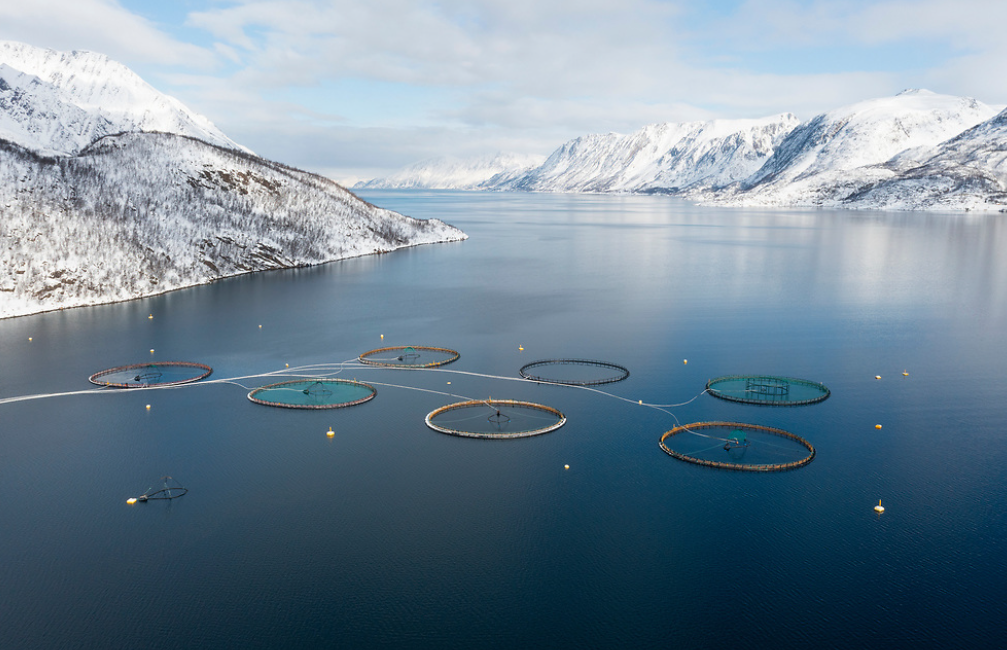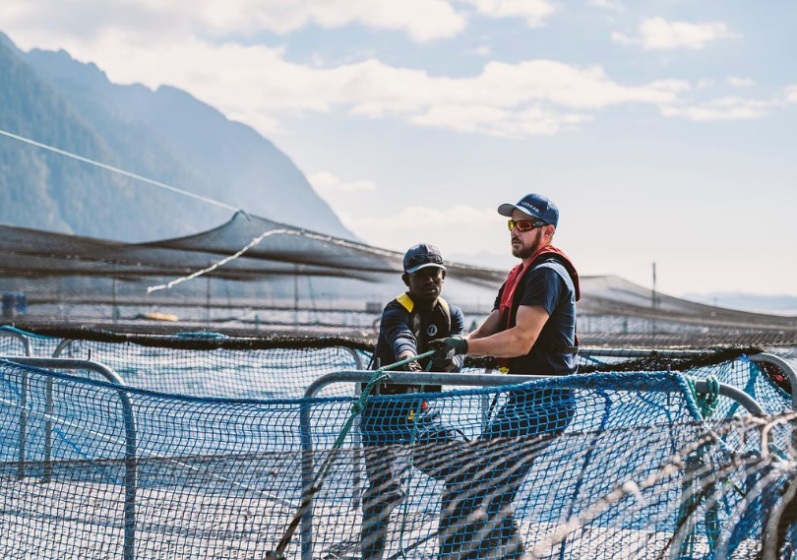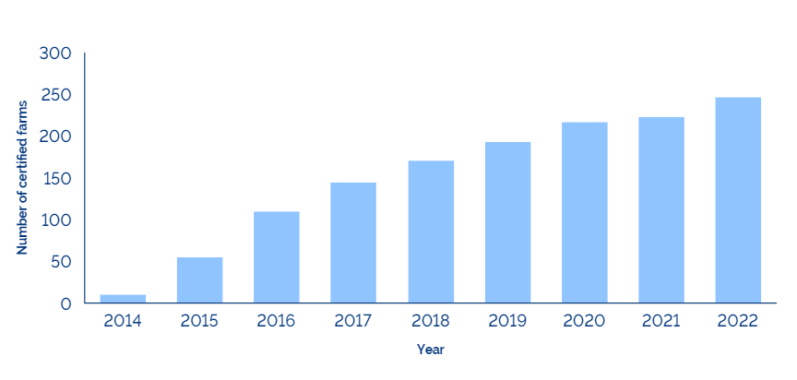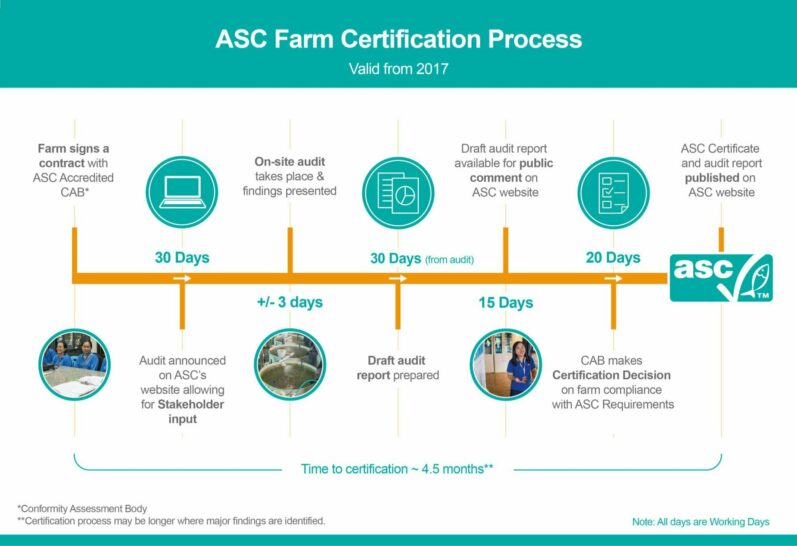How ASC certification supports GSI members to farm salmon that’s raised to be better

What ASC means to GSI members and our stakeholders
As members of GSI we are committed to working pre-competitively to improve the sustainability of our operations by reducing the environmental impact and increasing our positive social contribution to the people who consume our products and the local communities around our farms. We have chosen the Aquaculture Stewardship Council (ASC) Salmon Standard as our benchmark for progress against this objective. ASC is the only certification for farmed fish that Seafood Watch approves as a recommended choice for farmed salmon.
What does ASC certification mean for the salmon, the environment and our teams?
Developed through a multi-stakeholder, multi-year, International Social and Environmental Accreditation and Labelling Alliance (ISEAL) approved process which took 7 years to complete, ASC is widely acknowledged as the most rigorous standard for fish farming currently available. With over 150 indicators and 500 criteria covering the environmental, economic and social impacts of fish farming, the ASC Standard aims to safeguard the natural environment, biodiversity, water resources as well as ensuring good working conditions for employees. To become ASC certified farmers must meet all criteria and participate in annual audits to uphold certification.
To address environmental and social impacts effectively, the ASC standards for responsible farming have been organized around seven core principles, which require:
- Legal compliance with national and local laws and regulations
- Preservation of natural habitats, local biodiversity and ecosystem
- Preservation of the diversity of the wild population
- Preservation of water resources and quality
- Responsible use of feed and other resources
- Improved fish health, including controlled and responsible use of antibiotics and chemicals
- Farms to be socially responsible toward their workers and the local community
Requirements in the standard are based on performance-based metrics. This means that the standards do not describe what a farm should do, but rather what it should achieve, based on a clear measurement. As the ASC Standard is not static, and many of the indicators seek further improvement following certification, this encourages farmers to continually seek improvements and innovations to enhance their practices and further reduce environmental impact. In addition, the ASC Standard is the only certification program where the audit reports are made public. This added level of transparency is part of ASC’s commitment to full transparency and accountability not only at the farm-level, but also with retailers, researchers and communities.

How do GSI members work with the ASC Standard?
When GSI was launched in 2013, we committed to achieving 100% ASC certification across our farms. This was an ambitious goal, especially considering there were no salmon farms certified at this time.
At the end of 2021, we had achieved 48% of GSI member production being ASC-certified, and now, as of September 2022, we are at 64% certified. This significant uptake of the Standard across our farms means that we currently contribute over 600,000 tons of responsibly sourced ASC-salmon in the marketplace for consumers and this is likely to increase in years to come.
The ASC certification process is highly complex and takes a great deal of time and resources to ensure a farm achieves the rigorous standards required and completes the in-depth audit. Even for those farms not yet certified, we use the ASC Standard as a framework for improvements, and all GSI member companies are required to provide data annually for our Sustainability Report. This way all member farms are working with the ASC standards at top of mind to raise responsible salmon.
To help us on our way to achieving ASC certification across member company farms, we have a dedicated Task Force that meets monthly to discuss common challenges, problem solve and share best-practices to support accelerated progress towards the standard across all farming regions. They’ve held over 100 meetings since 2013!

Progress towards ASC certification across all member farms
What achieving ASC certification means for our business
Certification has become an integral part of the seafood industry as companies look to provide their customers and wider society with the assurance that they are operating responsibly and providing high-quality food. There are many certification programs available, and it was important for GSI to choose one that forced us to go beyond ‘business as usual’. We selected this standard to challenge us to make the significant improvements needed to get our industry to where it needs to be – as a sustainable food system – now and in the future.
The ASC program is also not static, meaning that all standards, reviews and revisions are constantly monitored to ensure their impacts are as expected, and adapt to changes in the industry ensuring it remains at the forefront of responsible production. This encourages and motivates ongoing improvements – whether it’s technological advances in how we monitor the fish behavior underwater or trialling a new innovative way to feed the fish. It’s about constantly pushing us to find new ways to elevate our aquaculture sustainability performance. For example, ASC is currently under public consultation for a fish welfare addition to the standard to expand its competencies into this important component of fish farming.
“Achieving ASC certification is not an easy task. It’s a significant investment and a steep learning curve as we understand and implement the necessary procedures. But over time we’ve come to realize that the investment is worthwhile, because it forced us to take a deep look at how we do things and see where we can make changes that will not only improve our environmental and social sustainability performance, but also make us a more efficient company” - Richard Finch, Cermaq BC
Another plus side to choosing ASC is the significant improvements to management processes. Because of the extensive data collection required for the ASC certification, companies have implemented new reporting measures and have found efficiencies in tracking each farm’s performance, which has left companies better equipped to quickly make changes as trends emerge.

Becoming ASC certified not only guides improvements on the farms, but it also provides crucial assurance to our customers and local communities that we are operating responsibly and raising healthy salmon, sustainably. Having this level of third-party validation and independent review brings a level of confidence and objectivity that we wouldn’t be able to provide ourselves. Once a farm achieves the ASC Salmon Standard certification, it becomes distinct from a non-certified farm.
Choosing ASC when you buy farmed salmon
For consumers, the ASC logo provides reassurance and confidence in purchasing a responsible product. When consumers buy ASC-certified products, they can feel good about the food they’re eating while simultaneously rewarding the hard work and dedication to responsibly managed farms. These purchasing decisions increase global demand for ASC-certified seafood, which leads to pressure that more farms achieve ASC certification and causes a ripple effect of greater environmental and social improvements around the world.
“ASC certification can help consumers make informed choices when buying seafood. It gives at-a-glance reassurance that the seafood comes from a farm which uses responsible farming methods that minimize environmental and social impacts. It lets consumers enjoy seafood with a clear conscience; they know where it came from and how it was produced. It ensures transparency, so that seafood products are traceable from farm to fork.” – Cermaq Sustainability Report

Farmed salmon is one of the most eaten seafood products around the world, and with that comes great responsibility to ensure fish are raised to the highest standards that support a healthy planet and a healthy population. We hope that by following the pathway to improvement set out by the ASC Standard, we can continue to achieve this mission. Follow our ongoing journey with ASC certification here.






Follow us on social media and sign up for the newsletter
X
Threads
LinkedIn
Instagram
YouTube
Newsletter